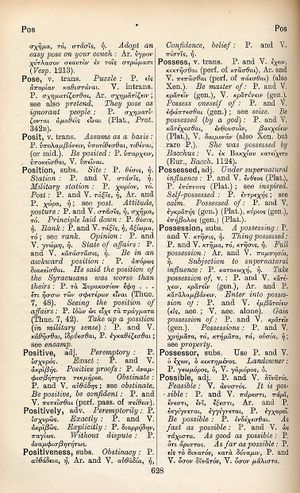possessor: Difference between revisions
From LSJ
Aristotle, Nicomachean Ethics, 5.30
(6_13) |
(D_7) |
||
| Line 6: | Line 6: | ||
{{Lewis | {{Lewis | ||
|lshtext=<b>possessor</b>: ōris, m. id.,<br /><b>I</b> a [[possessor]] ([[class]].)<br /><b>I</b> Lit., Cic. Phil. 5, 7, 20: bonorum, id. Quint. 8, 30: regni inertis, i. e. [[Pluto]], Luc. 6, 779; Hor. Ep. 1, 2, 49.—Esp. t. t. in [[law]] ([[post]]-Aug.), the [[possessor]] of the [[thing]] claimed; [[hence]], the [[defendant]] in a [[suit]] (opp. [[petitor]]), Plin. Ep. 6, 2, 2; Quint. 7, 1, 38; Paul. Sent. 5, 36, 1.—<br /><b>II</b> Trop.: Aquilo [[possessor]] Italici litoris, Petr. 114. | |lshtext=<b>possessor</b>: ōris, m. id.,<br /><b>I</b> a [[possessor]] ([[class]].)<br /><b>I</b> Lit., Cic. Phil. 5, 7, 20: bonorum, id. Quint. 8, 30: regni inertis, i. e. [[Pluto]], Luc. 6, 779; Hor. Ep. 1, 2, 49.—Esp. t. t. in [[law]] ([[post]]-Aug.), the [[possessor]] of the [[thing]] claimed; [[hence]], the [[defendant]] in a [[suit]] (opp. [[petitor]]), Plin. Ep. 6, 2, 2; Quint. 7, 1, 38; Paul. Sent. 5, 36, 1.—<br /><b>II</b> Trop.: Aquilo [[possessor]] Italici litoris, Petr. 114. | ||
}} | |||
{{Gaffiot | |||
|gf=<b>possessŏr</b>,¹⁰ ōris, m. ([[possideo]]), possesseur, propriétaire : Cic. Phil. 5, 20 ; de Or. 2, 283 || défendeur [en t. de droit] : Quint. 7, 1, 38 ; Plin. Min. Ep. 6, 2, 2 || [fig.] maître, souverain de : Petr. 114, 3. | |||
}} | }} | ||
Revision as of 06:43, 14 August 2017
English > Greek (Woodhouse)
subs.
Use P. and V. ὁ ἔχων, ὁ κεκτημένος. Landowner: P. γεωμόρος, ὁ, V. γαμόρος, ὁ.
Latin > English (Lewis & Short)
possessor: ōris, m. id.,
I a possessor (class.)
I Lit., Cic. Phil. 5, 7, 20: bonorum, id. Quint. 8, 30: regni inertis, i. e. Pluto, Luc. 6, 779; Hor. Ep. 1, 2, 49.—Esp. t. t. in law (post-Aug.), the possessor of the thing claimed; hence, the defendant in a suit (opp. petitor), Plin. Ep. 6, 2, 2; Quint. 7, 1, 38; Paul. Sent. 5, 36, 1.—
II Trop.: Aquilo possessor Italici litoris, Petr. 114.
Latin > French (Gaffiot 2016)
possessŏr,¹⁰ ōris, m. (possideo), possesseur, propriétaire : Cic. Phil. 5, 20 ; de Or. 2, 283

